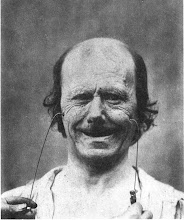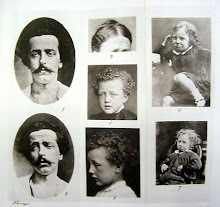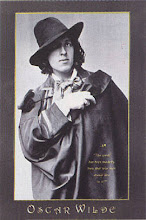A standing joke among criminal defense lawyers is the perspicacity of arresting officers in finding probable cause to search a truck or car for contraband.
"I suspected he was carrying drugs, because he would not look at me and the guilty avert their eyes." Or, "I suspected he was carrying drugs, because he looked right at me and that is what drug dealers do to avoid suspicion."
"He acted nervous." Or, "He acted too calm for someone who had been stopped by the police."
And the one I like: "He only had one key with him, and that is typical of drug dealers." The first time I heard that I was in the courtroom with only one key with me.
Many officers clearly have better noses than bloodhounds:
"I smelled the strong odor of burning marihuana." And, "I smelled the distinctive odor of wet marihuana."
And another favorite. "The car was empty, but I could tell it had been abandoned because of the smell of illegal aliens." I prepared a cross-examination on this to test the officer's nose on distinguishing between an illegal alien or a permanent resident or merely a laser passing card. Also, I thought it would be instructive if his nose could tell whether it was a Mexican illegal alien or a Central American illegal alien who might have a right to sanctuary claims.
At border crossings, a similar phenomena occurs in the claimed ability of the agents to tell a truth teller from a liar.
The typical statement: "No, I didn't know there were ten kilos of cocaine welded into the gas tank of the car I was driving."
The feds do not audiotape or videotape interviews, so there is always a dispute about what was actually said. If two officers are present, their versions will differ slightly. And then the accused will have a different version. And then there will be a dispute about what was written down and when. And how it should have been translated and if the officer actually understood.
The officer at trial will want to testify, "He hesitated and then stammered in his response, and moved his hand in a characteristic evasive manner, so in my experience, I could tell he was lying."
Just like the movie in which the prospective father in law claimed he was a human lie detector machine.
The inquiry to come, si Dios quiere, Readers True, is whether a lie detector machine or a lie detector person can really tell if someone is lying. This is of interest to me, naturally, because if you can tell when someone is lying I want to be able to do it for the purposes of judging a witness If the claim is just hogwash, I want to be able to show that during cross-examination.
In truth, I don't want to know if my friends are trying to protect me from an ugly truth, so I have no desire to apply the skill in personal life.
However, if a Javert or a Flambeau or a Monk can read the liar, it would be nice to find out. On the other hand, how do we distinguish that officer from Barney Fife and Fearless Fosdick when they come to testify?
For those among you who sit on the front row and raise your hand to be recognized, I offer the following texts in preparation for these (occasional and intermittent) sessions:
The Expression of the Emotions in Man and Animals by Charles Darwin.
Interrogations, Confessions, and Entrapment edited by G. Daniel Lassiter.
Never be Lied to Again by David J. Lieberman.
Principles of Kinesic Interview and Interrogation by Stan B. Walters.
What the Face Reveals edited by Paul Ekman and Erika L. Rosenberg.
Wednesday, April 9, 2008
Subscribe to:
Post Comments (Atom)


























_-_Dante_And_Virgil_In_Hell_(1850).jpg)























































6 comments:
Interesting commentary on the integrity of the local Gestapo.
Let’s consider a few statistics. Not lies, just statistics.
85% of all inmates are eventually released due to overcrowding. Eight of 10 will likely be back in prison within three years.
50% of inmates released from prison commit an average of 162 crimes per year. 40% commit less than 10 per year. The remaining 10% commit between 500 and 600 crimes per year.
Crime costs in the United States are $425 billion annually.
According to the national bestseller, “The Day America Told the Truth,” crime is 600% higher than what the media presents to the public.
According to CNN, America fills 1,100 new prison beds every day, at a cost of 70 - 80 million dollars per prison.
It costs you, the taxpayer, $16 billion per year to operate the U.S. prison system.
At the present rate of incarceration, it is estimated that one half of America will be in prison 55 years from now.
To imprison one person for life (30 years) costs the taxpayers over $1,000,000.
Since 1985, the total number of inmates in the custody of State and
Federal prisons and local jails has more than doubled.
Seems to me that there may be enough fault in the system that if it could be accurately quantified among the various contributing actors, that the poor dumbass beat cop shouldn’t be the scapegoat here.
What about the overpaid defense attorney who can’t beat a jaywalking ticket? What about the fatass incompetent politically wired judges? What about a jury of 12 morons not smart enough to get out of jury duty?
Give Barney a break.
FEFH.
Ed,
Interesting post. Very interesting.
We both know that there is more than one case where probable cause has been established. Not only will I concede this point, but I feel that there are many, many cases where lack of good legal representation has caused a person to go to jail when even adequate representation and they would have walked, guilty or otherwise.
You do overlook one point, however.
Reasonableness.
The ability to ascertain deception can not only be learned, but it can almost be near perfected, as a couple of your noted text will reveal. Your inability to do so, based on your personal frame of reference, will not allow you to believe that this is possible. To you, this is not reasonable.
Nor will it allow you to admit that an experienced Border Patrol Agent can tell you that the smell he describes has led to the location and apprehension of illegal aliens in 19 out of 20 instances. Or Marijuana for that matter. To you, this is not reasonable.
Sometimes when you see the fingerprint on the inside of the tire, it does mean it is loaded with cocaine, proven by the fact that your client is on trial. To you, that one print leading the officer to the cocaine is not reasonable.
At the end of the day, there are two points:
1. Many of the arrested are guilty.
2. Not all of the officers are lying.
I confess Professor; I did not read the assigned text prior to this submission.
Kurgan
BTW, I always wondered that of the defendants you refer to...how many of them used children in the commission of a felony (smuggling) and why wasn't Child Protective Services called?
Just curious.
Big oops,
I said: "We both know that there is more than one case where probable cause has been established".
I meant to say: "We both know that there is more than one case where the type of probable cause you are alluding to has been been established".
Sorry about that. Kinda' changes the context.
Will work on all flaws, sensei.
K
Thank you for your comment.
I'm still on this journey as well. If I discover that a high degree of reliability in detecting truth and falsity comes once the skills are learned, I am open to that possibility.
I am quite impressed with the K9 dogs and rarely try to challenge their noses.
I like and admire a skilled cop. I've represented many police officers and defer to greater skills when I have my own perspicacity to recognize them.
Your two points police often tell the truth, clients often lie, is very clear to me. I handle both cross examination and direct examination with those facts firmly in mind. Otherwise jurors would see me, correctly, as far from reality. Not a good way to get a verdict.
Also, I seldom argue with Darwin and this discussion begins with him.
Ed,
I apologize for being as fluid as I am, but you said:
"I am quite impressed with the K9 dogs and rarely try to challenge their noses."
This needs to be looked at very carefully. The dog's ability to detect obscure scent traces are not at issue, but the handler's abiity to intrepret the dog's recations should be.
Also, the PC issue can be a H-U-G-E part of the handler's queing the dog into something the dog does not perceive.
K
I agree, the handler's ability is another issue. Most of my experience with the dogs has arisen from border crossing cases in which probable cause is not required for a search.
I have been impressed that the dogs apparently can smell cocaine welded inside a box welded within a gas tank, surrounded by gas.
Usually, this issue cuts both ways. It takes a dog with a super nose to smell the cocaine, so there was no way my client have smelled it.
Of course, it is possible the information came from a tip so the dog was led to the search.
Post a Comment